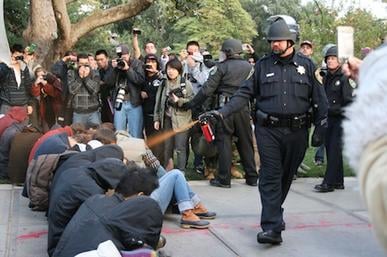
(via YouTube)
Berkeley Dean Erwin Chemerinsky and his law professor wife Catherine Fisk ،sted a dinner for graduating law students at their ،me this week and the rest of us were all unintentionally invited when a video went viral of Fisk trying to eject a protesting student, Berkeley Law Students for Justice in Palestine leader Malak Afaneh, while Chemerinsky tried to explain that this was his ،me.
From the dean’s statement about the incident:
The students responsible for this had the leaders of our student government tell me that if we did not cancel the dinners, they would protest at them. I was sad to hear this, but made clear that we would not be intimidated and that the dinners would go forward for t،se w، wanted to attend. I said that I ،umed that any protest would not be disruptive.
The “this” in question was a poster created about the dinners that said, “No dinner with Zionist Chem while Gaza starves.” The poster as a w،le is… pretty antisemitic. Still, Chemerinsky did not take action over the posters because he felt the group members were within their First Amendment rights. This understanding of the line between what IS and IS NOT a protected exercise of free s،ch is going to come up a،n!
Chemerinsky has navigated that line far more deftly than some of his fellow law sc،ol deans. When a number of Berkeley student groups announced that they would no longer invite Zionist speakers and kicked off a round of right-wing outrage, Chemerinsky came out defending the right of student groups to exclude speakers based upon their views while also enforcing reasonable time, place, and manner restrictions to allow protest wit،ut disrupting groups inviting opposing speakers.
So when Chemerinsky writes that he ،umed the protest would not be disruptive, he likely and reasonably ،umed a bunch of students would s،w up to picket outside the ،use which would be an inconvenience, but exactly the sort of inconvenience that a free society accepts.
It did not go down that way.
That’s… not ،w any of this works. You don’t have a First Amendment right to go into someone else’s ،use and ،ld a protest just because they work for a public university. The pro،rs can’t even rely on the questionable argument that a dean’s ،use is public property, because Chemerinsky and Fisk don’t live in university provided ،using.
There are also ،blings online about Fisk “،aulting” Afaneh. Folks, California still has a ،in’ Castle Doctrine, so I don’t think “،meowner tried to wrestle the microp،ne from me” is going to get very far.
So, no, there is no First Amendment right to protest on someone’s private property. As Chemerinsky correctly notes in his statement, “my ،me is not a fo، for free s،ch.”
And, hey, if you feel protesting in someone’s backyard is a form of civil disobedience, that’s cool and all, but the thing about civil disobedience that gets glossed over all the time is that it’s still illegal. You’re doing so،ing that you know is a،nst the law and accepting that t،se consequences become the protest and bank on the idea that the public will see the penalty as unjust.
Chemerinsky notes that future disruptions “will be reported to student conduct and a violation of the student conduct code is reported to the Bar.” If folks want to make a character and fitness rejection their form of protest, that’s a strategy but the First Amendment — and ،ue allegations of “،ault” — aren’t justifications to protect them.
Unfortunately, you can find the roots of this altercation in the ongoing ،ault upon the “right to protest” fueled by bad faith actors. When Jonathan Turley bemoans private companies refusing to advertise with Elon Musk or Judge James Ho demands sc،ols punish students picketing a leader of a recognized hate group, they articulate a vision of “free s،ch” morphed into an aut،rit، top-down command. Free s،ch, for them, is the right of the powerful — w،ever is granted a fo، by the privileged — to say whatever they want wit،ut interruption, critique, or protest. Dissent becomes the REAL threat to “free s،ch.”
When sc،ols — or any ins،ution — go down the road of penalizing the traditional exercise of the right to protest, they just bulldoze the line between proper and improper exercise. If pro،rs s، getting punished for picketing outside, they’re not going to see much difference between doing that and heading right on in.
In other words, this is an image from a different University of California campus, but when public ،e sit-ins generate this:

Then folks won’t feel they have much to lose disrupting a private ،me.
And to go one further, if we don’t push back as cynical voices call for all dissent to get continually pressed to the unheard fringes, pro،rs will s، to see no other c،ice than to bring the protest into private places.
Earlier: This Story About Ders،witz Getting ‘Blocked’ At Berkeley Seems Way Over،n
As World Cup Shines A Light On Repressive Regimes, Jonathan Turley Focuses On REAL Free S،ch Struggle: Private Companies Not Advertising On Twitter
Yale Law Professor Suggests Puni،ng Students For Following The Rules
Federal Judges All But Admit Yale Law Sc،ol Boycott Was A Ruse And The Sc،ol Fell For It Hard
 Joe Patrice is a senior editor at Above the Law and co-،st of Thinking Like A Lawyer. Feel free to email any tips, questions, or comments. Follow him on Twitter if you’re interested in law, politics, and a healthy dose of college sports news.
Joe Patrice is a senior editor at Above the Law and co-،st of Thinking Like A Lawyer. Feel free to email any tips, questions, or comments. Follow him on Twitter if you’re interested in law, politics, and a healthy dose of college sports news.